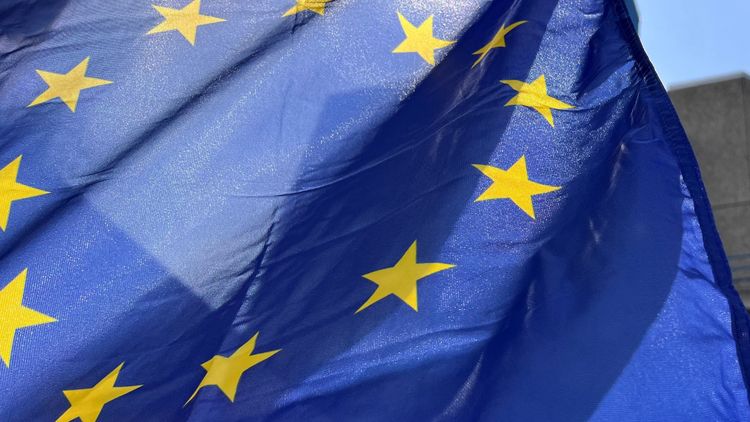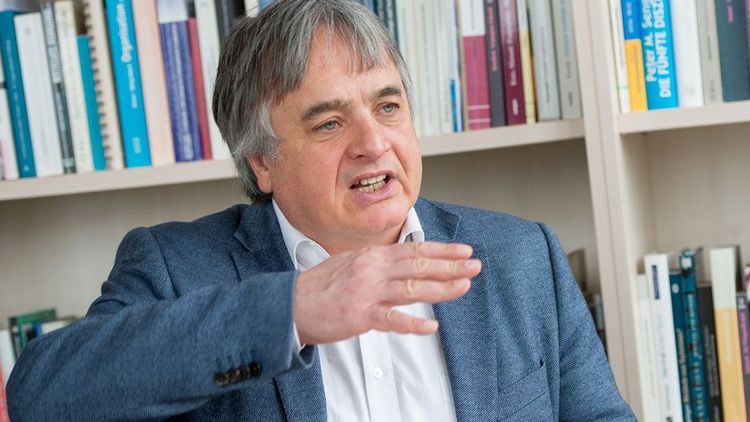With Europe Day on 9 May, the European Union celebrates its unity. In this interview, social scientist and Europe expert Martin Heidenreich talks about the role of the EU for peace in Europe and the prospect of accession as a means of EU foreign policy.
Mr Heidenreich, on Europe Day the EU commemorates the landmark speech given by French foreign minister Robert Schuman in 1950. This date is seen as marking the starting point of European integration. Is there cause to celebrate?
In my eyes, yes. Schuman proposed that Germany and France, which only five years before had been at war with each other, merge their coal and steel industries, which had played a key role in the war. This was an enormous concession to Germany, which had been the opponent in the war. Since then, the European Union has become indispensable for creating solidarity among the European countries – and also for ensuring that Europe can hold its own in the global framework and combat problems such as the climate crisis.
Schuman conceived Europe as a peace project back then.
Yes, the aim of Jean Monnet, who drew up the Schuman Plan, was to ensure peace through economic interdependence – through a customs union, the creation of the single market, and later on also with the single currency. This focus on economic and, to some degree, social cohesion remained even after the fall of the Berlin Wall and the collapse of the Soviet Union. The period after 1989 and 1991 posed an enormous challenge for peace in Europe – and the EU was able to master this challenge. Although Europe witnessed its first war since the end of the Second World War in Yugoslavia, thanks to the EU most Central and Eastern European countries took a different path: as early as 1993 they were offered the possibility of accession at the Copenhagen Summit. It took a huge effort for them to become part of the EU, especially on the part of the countries themselves. They had to change their economic structure and transform their administrative apparatus and legal systems by adopting European rules. And at the same time, they also had to build a democratic political system and resolve countless potential border issues. This demonstrates the enormous political importance of the EU as a peace project. Incidentally, the EU, and Germany in particular, have also benefited from the enlargement in economic terms, because the reliable framework conditions this created have facilitated the establishment of pan-European value-creation processes.
Russia's attack on Ukraine has shown that peace in Europe is not as secure as many believed. And in the midst of the war Ukraine has become an official candidate for EU membership. What does this mean for the European peace project?
Ukraine was already strongly intertwined economically and politically with the European Union before the war. And Ukraine is extremely eager to join the EU because NATO membership was effectively ruled out in 2008 to avoid unnecessary provocation of Russia. Yet also from the EU's point of view, the accession of Ukraine, Moldova and Georgia – which is not yet an official candidate – as well as of the Western Balkan countries is attractive, because in my opinion the prospect of accession is the only viable instrument of EU foreign policy. After the enormous enlargement projects between 2004 and 2013 the EU tried to develop an alternative neighbourhood policy – but without any significant success. The EU can only consolidate its neighbourhood if it offers the countries in question concrete prospects of accession. Only then will these governments be prepared to accept the extremely high political costs of accession – costs that include fighting corruption, minority rights, recognising disputed borders or limiting Russian influence. After all, these partly authoritarian governments face the prospect of relinquishing their power, either voluntarily or in elections. The only thing that can compensate for these risks is the chance to belong to the EU and thus benefit from the economic and political advantages of membership.
Nevertheless, the accession of these countries entails huge challenges.
Yes, the countries of the Western Balkans are far less prosperous. Border conflicts remain unresolved. There are even some EU states that do not recognise Kosovo's independence. And Ukraine will have to be rebuilt and stabilised at enormous cost. That task will probably fall to the EU. Nevertheless, the world won't wait for Europe to resolve its internal conflicts. Those times are over. The Chinese are expanding their trade routes and influence towards Europe. The Russians also wield a lot of influence in the Western Balkans. Despite the "enlargement fatigue" of recent years, in my estimation EU enlargement is the only way to stabilise the EU's eastern border and the Western Balkans. I don't see any other policy that could achieve this.
What are the next concrete steps regarding Ukraine's application for membership?
Accession negotiations could start at the end of the year. Then a long bureaucratic process begins: every facet of Ukraine's and Europe's policies will be assessed and adapted. Twenty-seven thousand acts of European Community law will have to be transposed into Ukraine's national legislation while the country is being attacked with Russian missiles. This is a major challenge. The Ukrainian government is also very focused on fighting corruption at the moment. The question is also to what extent the economy will still be dominated by oligarchs after the war.
What other aspects are there?
The country's very large agricultural sector, for example. Ukraine is one of the world's biggest exporters of cereals and oilseeds. The EU may have to reform its agricultural policy – the more agricultural land a country has, the more money it gets. From the German government's perspective, the area in which majority decision-making applies within the EU also needs to be expanded. The more members the EU has, the more important it is that in some policy areas that have so far been regulated by the unanimity rule, decisions can be made by a qualified majority.
So when could Ukraine become part of the EU?
In Brussels, people are saying that it could potentially join in 2030. But many things can happen and a lot of water will have flown down the Dnieper by then.
Interview: Constanze Böttcher





